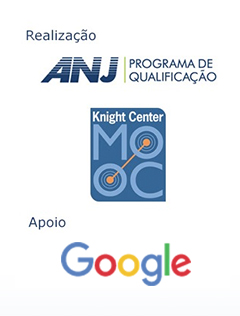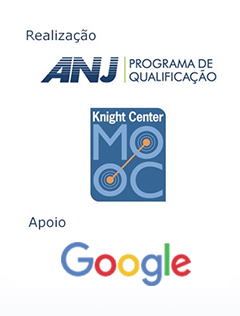
Offering attractive multimedia narratives has become essential to digital media following the growing trend of online video audiences worldwide. Two recent studies, one conducted by the Tow Center and another by the Reuters Institute, point to online audiovisual production as one of the “super powers” of journalists who seek to differentiate themselves in the digital market. And it is this superpower that will be taught in the new massive open online course (MOOC) of Brazil’s National Association of Newspapers (ANJ for its acronym in Portuguese) and the Knight Center for Journalism in the Americas, with support from Google.
“News video production for the Internet” will be offered in Portuguese, from June 6 to July 3. For more information about the course and to register, click here.

The MOOC will be taught by one of the most experienced video journalism professionals in Brazil, João Wainer, former editor of TV Folha and winner of the Prêmio Esso in Television Journalism for coverage of the June 2013 protests.
In four weeks, Wainer will show how journalists can develop a strong and consistent narrative in audiovisual production, including lessons on the resources required to be a video journalist, necessary equipment, how to capture audio and how to assemble and finish videos for the internet.
“It is clear that new generations increasingly are informed through video and this makes the development of a new journalism language for the web something fundamental for the survival of the text-based outlets,” said João Wainer, explaining that the emphasis of the course will be on helping professionals from print media to produce video for digital devices.
“In this course, I will share with the students my professional experience as head of TV Folha,” he added. “I hope this can help to clarify the still murky paths of those moving to this area.”
Like all previous MOOCs from the Knight Center, this course is aimed primarily at journalists, but any person around the world with an internet connection can participate. Editors, reporters, designers, photographers or anyone interested in video can register. Previous experience with the concepts or tools is not required.
“The inclusion of multimedia content, especially video, in the digital platforms of journalism companies is a very powerful way to attract audience and advertising revenue. But it must be clear that it is not content or something produced amateurishly,” said Ricardo Pedreira, ANJ executive director. “With this MOOC that ANJ is offering, in partnership with the Knight Center for Journalism in the Americas and the support of Google, to its members, Brazilian newsrooms can take a qualitative leap in digital products.”
“We are very excited to offer this free training to journalists from all over Brazil, especially for those who are going through the transition from print media to multimedia,” said Rosental Calmon Alves, founder and director of the Knight Center at the University of Texas at Austin. “And we are grateful for this new partnership with the National Association of Newspapers and Google.”
This course will include videos, tutorials, reading materials, exercises and discussion forums. Like previous MOOCs from the Knight Center, the course is divided into weekly modules and will be fully asynchronous, meaning there will be no live classes. Although each student can take the course at the times and days they like, each modules will have a weekly deadline for submission of assignments and participation in discussion forums.
Anyone can sign up for our online MOOC program. Once registered, the participant will be instructed to access the course. People enrolled have immediate access to the course schedule that lists the lessons of each module and introductory information on how to use the Knight Center’s learning platform.

Although the course is free, if participants wish to receive a certificate, they must comply with the requirements and pay and online administrative fee of $30 using an international credit card. The certificate will be issued only to students who have actively participated in the course and completed the proposed tests and exercises. The certificates will be downloaded from the internet in PDF format after the Knight Center verifies that the participant has fulfilled the course requirements. No formal course credit of any kind is associated with the certificate.
This is the 20th MOOC offered by the Knight Center at the University of Texas at Austin since it launched its pioneering and unique MOOC program for journalism courses in 2012. About 70,000 people from 160 countries have benefitted from this initiative.
This is the fourth MOOC in Portuguese that the Knight Center has organized with ANJ, with support from Google. The courses “Introduction to Infographics and Data Visualization” and “Introduction to Mobile Journalism” were offered in 2014 and “Basic Techniques of Data Journalism” in 2015.
The National Association of Newspapers brings together the leading dailies in Brazil. The ANJ was established in 1979 to defend freedom of expression, thought and propaganda; the functioning of a press without restrictions, observing the principles of responsibility; to fight for human rights, the values of representative democracy and free enterprise.
Google is a leading global technology company dedicated to improving the ways in which people connect with information. Google’s innovations in Internet search and advertising have made its website a leading Internet product and its brand one of the most recognized in the world.
The Knight Center for Journalism in the Americas was created in 2002 by Professor Rosental Calmon Alves, holder of the Knight Chair in Journalism and UNESCO Chair in Communication at the School of Journalism of the University of Texas at Austin. The Center has received contributions from the John S. and James L. Knight Foundation and other donors such as the Open Society Foundations and the School of Communication at the University of Texas at Austin.

Knight Center for Journalism in the Americas
300 West Dean Keeton
Room 3.212
Austin, TX, 78712
Phone: 512-471-1391
Email: journalismcourses@austin.utexas.edu